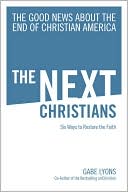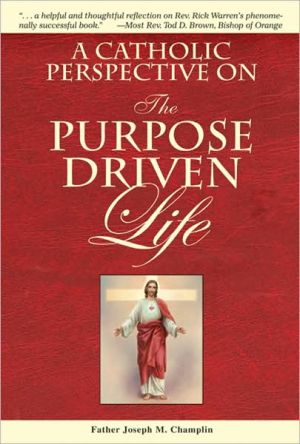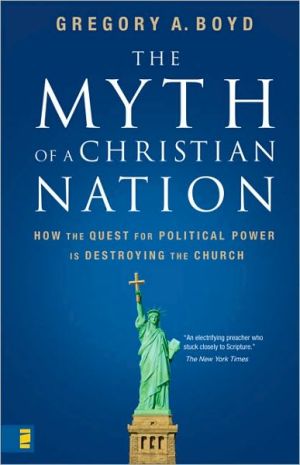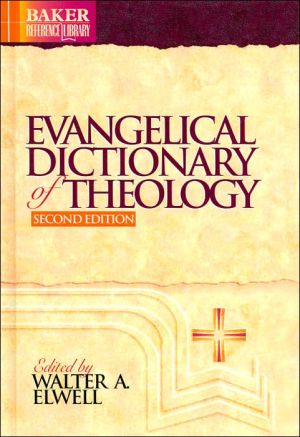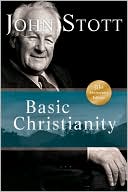Theology for the Community of God
This proven systematic theology represents the very best in evangelical theology. Stanley Grenz presents the traditional themes of Christian doctrine— God, humankind, Christ, the Holy Spirit, the church, and the last things—all within an emphasis on God’s central program for creation, namely, the establishment of community. Masterfully blending biblical, historical, and contemporary concerns, Grenz’s respected work provides a coherent vision of the faith that is both intellectually satisfying...
Search in google:
This proven systematic theology represents the very best in evangelical theology. Stanley Grenz presents the traditional themes of Christian doctrine— God, humankind, Christ, the Holy Spirit, the church, and the last things—all within an emphasis on God s central program for creation, namely, the establishment of community. Masterfully blending biblical, historical, and contemporary concerns, Grenz s respected work provides a coherent vision of the faith that is both intellectually satisfying and expressible in Christian living. Available for the first time in paperback. J. I. Packer Clear, well-informed, up-to-date, and firmly anchored in the mainstream of Christian wisdom. . . . An outstanding achievement.
Introduction: The Nature and Task of Theology The Theological Task The Historical Development of Theology The Relationship of Theology to Other Concepts The Ongoing Nature of the Theological Task Dangers in the Theological Enterprise Theological Method The Sources for Theology The Integrative Motif of Theology The Structure of the Theological System Theology and Ethics Part 1: Theology: The Doctrine of God The God Who Is The Reality of God in an Era of Atheism In the Christian Era: Does God Exist? The Rise of Intellectual Atheism Theology and the Modern Situation Christian Faith in the Contemporary Context Knowledge of God in an Era of Agnosticism The Claim to Know God and Intellectual Agnosticism The Means to Knowledge of God Knowing God The Triune God Trinitarian Doctrine in Theological History Historical Development of Trinitarian Doctrine Trinitarian Doctrine in Post-Cappadocian Theology The Formulation of Trinitarian Doctrine The Content of Trinitarian Doctrine The Filioque and the Relational Trinity Analogies to the Trinity The Theological Implication of Trinitarian Doctrine Love as the Essence of God Love and the Divine Holiness, Jealousy, and Wrath Love and the Other Moral Attributes Trinitarian Doctrine and Christian Life Trinitarian Prayer Trinitarian Ethics The Relational God The Nature of the Relational God God as (a) Being God as Transcendent and Immanent God as Spirit God as Person The Name of God The Divine Attributes The Attributes and the Divine Substance The Division of the Attributes The Eternal God The Good God The Practical Importance of the Attributes The Creator God God as the Creator of the World The Creation of the World as the Act of God The Creation of the World as a Trinitarian Act The Act of Creation and the Sovereign Creator The Time of Creation God as the Providential Administrator of the World "Community" as God's Purpose for Creation The Doctrine of Providence in Recent Theology God's Administration of His World Part 2: Anthropology: The Doctrine of Humanity The Human Identity and our Origin in God Our Place in Creation Humankind and the Cosmos in Changing Cultural Contexts Christian Faith and the Insights of Anthropology "Openness to the World" and General Revelation The Question of General Revelation in Theology The Theological Importance of General Revelation God as Our Origin The Existential Significance The Essential Significance Our Temporal Origin The Question of the "First Human" The "First Human" and Evolution Anthropology and Our Temporal Origin Our Nature as Persons Destined for Community Our Ontological Nature Autonomy versus Determinism Human Substances The Origin of the Soul The Soul and Our Ontological Nature Humans as the Image of God The Image of God in Theological History The Image of God in the Bible The Theological Significance of the Image of God Sin: The Destruction of Community The Nature of Sin Biblical Terms for Sin Sin and the Human Person The Essence of Sin Original Sin The Fall of Humankind—the Fall of Adam The First Sin and the Sin of Humankind Original Sin and Guilt The Reality of Original Sin The Results of Sin: Our Human Situation Alienation Condemnation Enslavement Depravity Our Spiritual Co-creatures The Nature of the Spiritual Realities Angelology in Christian Theology A Biblical Theology of Angels A Biblical Theology of Demons A Biblical Theology of Satan Angelology and Structures of Existence The Structures of Existence Structures of Existence and the Bible A Theology of the Structures The Demonic and Superstition Superstition and the Old Testament The Status of the Powers Lying behind Superstition A Christian Stance toward Superstition Part 3: Christology: The Docrtine of Christ The Fellowship of Jesus the Christ with God Foundations: Jesus, the Divine One Development of the Affirmation of Jesus' Deity The Basis of Christology The Foundation of Our Christological Affirmation The Historical Foundation and Faith Implications: Jesus as One with God Jesus' Unity with God Jesus' Fellowship with the Father Jesus' Lordship The Fellowship of Jesus the Christ with Humankind Jesus as a Human Development of the Affirmation of Jesus' Humanity Jesus as Sharing in True Humanness Jesus as the True Human The Foundation for Affirming Jesus as the True Human The Content of Our Affirming Jesus as the True Human Jesus as the New Human Jesus as the Universal Human Jesus and the Marginalized Jesus and Women Jesus and the Individual The Fellowship of Deity and Humanity in Jesus Jesus as Divine and Human The Historical Debate concerning Jesus' Person The Foundation for Affirming the Unity The Relationship between Deity and Humanity in Jesus The Incarnation The Incarnation in Theological History The Critique of Incarnational Christology Jesus' Preexistence The Virgin Birth The Historical Context of the Modern Debate Current Debate about the Virgin Birth Points of Debate concerning the Virgin Birth The Virgin Birth and Christology The Mission of Jesus The Vocation of the Earthly Jesus Fulfilling the Old Testament Hope Heralding the Divine Reign The One Sent to Die Jesus' Self-Consciousness The Atonement and the Mission of Jesus The Atonement in Theological History The Significance of Jesus' Death in the New Testament Jesus' Death and Us The Ongoing Work of Christ The Exaltation Jesus' Present and Future Ministry Implication of Jesus' Ongoing Ministry for Prayer Part 4: Pneumatology: The Doctrine of the Holy Spirit The Identity of the Holy Spirit The Spirit in Salvation History The Holy Spirit and the Old Testament Era The Holy Spirit and the Christ The Spirit and the Community of Christ The Spirit in the Trinitarian Life The Foundation of Pneumatology in the Immanent Trinity The Holy Spirit and the Economic Trinity The Spirit and the Scriptures The Spirit as the Foundation of Scripture Inspiration and Illumination The One Act of the Spirit The Task of the Spirit Speaking through Scripture Scripture as the Source of Spiritual Sustenance The Constitutional Role of Scripture The Bible and Revelation The Concept of Revelation The Bible as Revelation Biblical Authority The Trustworthiness of Scripture The Extent of Biblical Authority The Dynamic of Conversion The Individual Aspect of Conversion Repentance Faith Our Response: Repentance and Faith The Divine Aspect of Conversion The Spirit's Activity in the Conversion Process Conversion and the Baptism of the Spirit The Community Aspect of Conversion The Role of the Community in Conversion Conversion and Church Initiation Rites Individual Salvation: The Wider Perspective The Process of Salvation Conversion Sanctification Glorification The Eternal Context of Salvation Divine Election Election to Community The Ordo Salutis Part 5: Ecclesiology: The Doctrine of the Church The Church—The Eschatological Covenant Community The Church as a Covenant People Ekklesia The Nation, the Body, and the Temple The Church as Mystical, Universal, and Local The Marks of the Church The Church as the Sign of the Kingdom The Biblical Conception of the Kingdom The Kingdom and the Church The Church as Community The Basis in the Covenant and the Kingdom Community and the Divine Nature The Ministry of the Community The Purpose of the Church The Church in God's Purposes God's Purpose in Glorification The Mandate of the Church Worship Edification Outreach Community Acts of Commitment Acts of Commitment and the Church The Function of Acts of Commitment The Number of Commitment Acts Baptism: The Seal of Our Identity Background and History The Meaning of Baptism The Working of Baptism The Subjects of Baptism The Mode of Baptism The Lord's Supper: Reaffirming Our Identity The Presence of the Lord in the Celebration The Meaning of the Lord's Supper Our Presence at the Lord's Supper The Organization for Community Life Membership in the Community Community Membership in the First Century Baptism and Community Membership Baptism after the First Century Community Structures The Government of the Community Government within the Communities Leadership for the Community Offices in the Communities Offices of the Community Ordination by the Community The Basis for the Practice of Pastoral Ordination The Significance of Ordination Part 6: Eschatology: The Doctrine of Last Things The Consummation of Personal Existence The Significance of Death The Problem of Death The Biblical Trajectory The Theological Significance of Death Overcoming Death in the Resurrection The Nature of Culminated Personal Life The Possibility of the Resurrection Hope in the Face of Death Competing Visions of Life after Death Biblical Insight into the Intermediate State The Situation of the Righteous beyond Death The Consummation of History The Meaning of History Christian Hope in a Changed Context Corporate Eschatology and the Biblical Message The Significance of History The Presence of Community in and beyond History History's Goal as "Already" History's Goal as "Not Yet" The Climax of History Apocalyptic and Millenarianism The Millennium in Christian Theology The Deeper Issue of Millennialism The Era of the Imminent End of History The Consummation of God's Cosmic Program The Transition from Creation to New Creation The Judgment of the Cosmos The Judgment of Humankind The Dark Side of the Judgment Universalism Conditional Immortality The Reality of Hell The New Creation The New Creation as the Renewal of the Cosmos The New Creation as Fullness of Community The Significance of Eschatology Eschatology as Insight into the Present Eschatology as God's Call in the Present The Foundation for God's Eschatological Call Aspects of God's Eschatological Call Eschatology as Insight for Living Eschatological Living as Hopeful Involvement Eschatological Living as Realistic Engagement Eschatological Living in the Light of the Eternal Indexes Subject Index Name Index Scripture Index
\ Christianity TodayA fresh reappropriation of the evangelical and catholic heritage of the faith.\ \ \ \ \ Francis Schussler FiorenzaA significant contribution to systematic theology. . . . An excellent and indispensable textbook for courses in Christian theology.\ \ \ J. I. PackerClear, well-informed, up-to-date, and firmly anchored in the mainstream of Christian wisdom. . . . An outstanding achievement.\ \ \ \ \ Scottish Journal of TheologyTheology for the Community of God signals a clear turning of the corner for evangelical systematics.\ \


